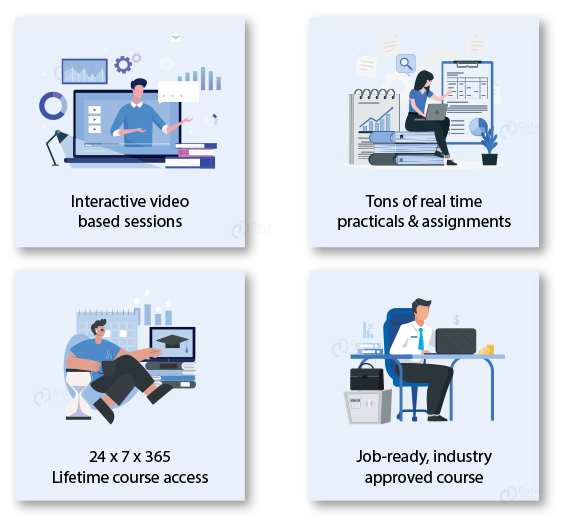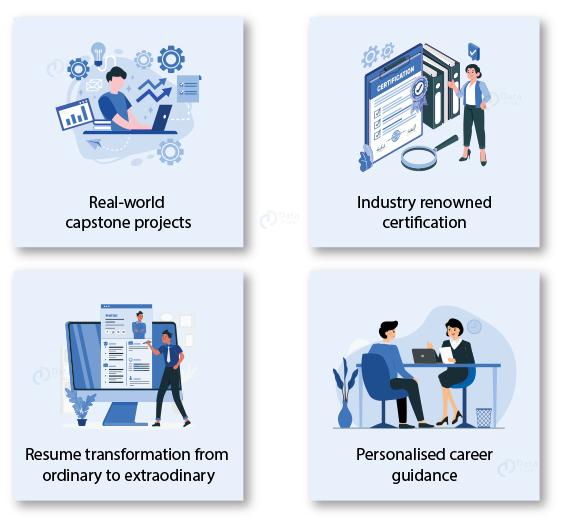OpenCV Certification Course – Learn Computer Vision with Python [Hindi]
OpenCV, which stands for Open Source Computer Vision Library, is a robust library of open-source software for computer vision and machine learning. It makes it possible for programmers to design apps for a variety of purposes, including image processing, facial recognition, and object identification. Participants will learn how to modify images and videos, perform feature identification, and apply different computer vision techniques as they delve into the fundamentals of OpenCV in this course.
What will you take home from this OpenCV Course?
- Self paced video-based course
- Complete study materials, practicals, quizzes, projects
- Acquire practical knowledge which industry needs
- Practical OpenCV course with real-time case-studies
- Lifetime access with industry-renowned certification
|
Start Anytime, it’s self-paced |
Course Duration 10+ Hrs |
Access Duration 1 Year |
Price
|
 OpenCV, which stands for Open Source Computer Vision Library, is a robust library of open-source software for computer vision and machine learning. It makes it possible for programmers to design apps for a variety of purposes, including image processing, facial recognition, and object identification. Participants will learn how to modify images and videos, perform feature identification, and apply different computer vision techniques as they delve into the fundamentals of OpenCV in this course.
OpenCV, which stands for Open Source Computer Vision Library, is a robust library of open-source software for computer vision and machine learning. It makes it possible for programmers to design apps for a variety of purposes, including image processing, facial recognition, and object identification. Participants will learn how to modify images and videos, perform feature identification, and apply different computer vision techniques as they delve into the fundamentals of OpenCV in this course.
What will you take home from this OpenCV Course?
- Self paced video-based course
- Complete study materials, practicals, quizzes, projects
- Acquire practical knowledge which industry needs
- Practical OpenCV course with real-time case-studies
- Lifetime access with industry-renowned certification
|
Start Anytime, it’s self-paced |
Course Duration 30+ Hrs |
Access Duration 1 Year |
Price
|
Why should you enroll in this openCV Course?
- Ability to do basic image processing operations like edge recognition, sharpening, and blurring
- Advanced computer vision algorithms for motion tracking, feature extraction, and object detection are known
- Aptitude for putting into practice machine learning models for emotion detection and facial recognition
- Knowledge of creating panoramas and image stitching for immersive visual experiences
- The capacity to add filters and transformations to improve image quality and retrieve useful data
- Knowledge of marker detection and overlay in augmented reality (AR) applications
- Proficiency in gesture recognition and motion detection for interactive computer-human interaction
- Practical project experience involving the application of OpenCV concepts in real-world scenarios
- OpenCV is extensively utilized throughout diverse industries, providing ample employment prospects for proficient experts
- Maintain your competitiveness by learning OpenCV, which improves your computer vision skills
- OpenCV lets you work on fascinating projects in industries like robotics, healthcare, automotive, and more
- Practical experience with real-world projects is provided in this course, which enables you to apply principles in real-world situations
- You will be able to fit your studies around your schedule and learn at your own speed and convenience with online access
- To advance your learning process, establish connections with colleagues and subject-matter experts to exchange knowledge and insights
- You will stay up-to-date on the newest methods and algorithms utilized in computer vision applications
OpenCV Course Objectives
The OpenCV course gives participants a thorough understanding of computer vision and equips them with the expertise to make the most out of the Open Source Computer Vision Library. Participants will go through basic ideas and sophisticated methods over the course, mastering skills in image processing, object identification, facial recognition, and other areas.
Participants will gain an understanding of the theoretical underpinnings of computer vision through practical exercises and hands-on projects, as well as the capacity to apply these concepts to real-world situations. The OpenCV course offers an organized learning environment where participants may delve deeply into the nuances of OpenCV, all under the guidance of knowledgeable professors.
Participants will learn how to use the OpenCV library, process photos and videos, use computer vision techniques, and create applications for a variety of fields through a combination of theoretical lectures and hands-on demos. Upon completion of the course, participants—whether they are aspiring data scientists, computer vision engineers, or software developers—will possess the knowledge and abilities necessary to take on challenging computer vision problems and make significant contributions to initiatives and projects in a variety of industries.
The OpenCV training’s course objectives are designed to give attendees a thorough understanding of computer vision principles as well as hands-on experience utilizing the Open Source Computer Vision Library. First and foremost, the course seeks to acquaint learners with the core ideas and features of OpenCV, such as object detection, feature extraction, and image processing.
Learners will gain an understanding of the OpenCV library’s architecture, how to use its vast array of functions and algorithms, and how to navigate through it. The workshop also seeks to provide learners with the skills necessary to use OpenCV approaches to solve real-world issues and create useful applications.
The program will teach participants how to evaluate visual data, derive insights from it, and apply computer vision algorithms to problems in robotics, healthcare, surveillance, and other fields. Participants will improve their problem-solving, algorithm development, and project execution utilizing OpenCV abilities by working on practical projects and case studies. The ultimate goal of the OpenCV course is to equip participants with the skills and knowledge required to successfully use OpenCV and succeed in the computer vision industry.
Why should you learn OpenCV?
With the help of OpenCV technology you will be able to create potent solutions in the tech industry and become a valuable asset. Below are some factual and statistical statements to prove the importance of OpenCV-
- “OpenCV is the backbone of many computer vision projects, offering robust tools for image processing and analysis.” – TechCrunch
- “OpenCV empowers developers to unleash the full potential of computer vision, driving advancements in various industries.” – Microsoft
- “Learning OpenCV opens doors to exciting career opportunities and enables you to make a meaningful impact with your skills.” – LinkedIn Learning
- “Proficiency in OpenCV is essential for developers looking to build cutting-edge computer vision applications.” – Forbes
- “With OpenCV skills, you can create innovative solutions in areas like autonomous vehicles, medical imaging, and augmented reality.” – NVIDIA
What is OpenCV?
A popular open-source computer vision and machine learning software library is called OpenCV, or Open Source Computer Vision Library. Since its initial development by Intel in 1999, a thriving community of academics, developers, and enthusiasts has been responsible for its ongoing development and maintenance. With its extensive library of algorithms and methods for real-time computer vision applications, OpenCV is written in C++ and Python.
Because it supports so many various platforms, such as Windows, Linux, macOS, Android, and iOS, it is extremely adaptable and useful in a variety of contexts. For applications including image processing, object detection, facial recognition, motion tracking, and more, OpenCV offers a full toolkit.
It contains effective versions of well-known computer vision algorithms, making it simple for academics and developers to create and implement computer vision applications. OpenCV is a fundamental tool for computer vision practitioners and researchers, whether they are working with visual data analysis, feature extraction from images, or developing intelligent systems that can see and comprehend their surroundings.
What to do before you begin?
Before starting this learning voyage, students are welcome to go through the prerequisites of this OpenCV course. These prerequisites will help you learn the course more efficiently –
- Basic knowledge of the Python programming language, including variables, data types, loops, functions, and syntax, is always beneficial to know.
- It is advised to have some knowledge with NumPy operations and array manipulation, as OpenCV significantly depends on NumPy arrays for image processing and manipulation.
- It can be helpful to have some prior understanding of the fundamentals of image processing, such as pixel manipulation, grayscale conversion, and picture filtering.
- Students should make sure that the OpenCV library and any required dependencies are installed on their system in order to complete the projects and practical exercises.
Who should go for this OpenCV course?
For anyone who wants to work in the field of computer vision and image processing or who wants to advance their skills in this area, the OpenCV course is excellent. In particular, this OpenCV training can help the following people-
- Aspiring Software Engineer and Developers
- Aspiring Data Scientists
- Robotics Engineering Enthusiasts
- Entrepreneurs
- IT Graduates and Students
- Freelancers
By enrolling in our OpenCV course, you can expect the following benefits:
Participants in this OpenCV program will get thorough understanding and useful abilities for using the Open Source Computer Vision Library in a variety of applications. Participants will study fundamental ideas like object detection, feature extraction, and image processing through an organized curriculum.
Students will gain knowledge of various image representations, how to modify and analyze images and videos, and how to apply algorithms for morphological operations, edge detection, and image filtering. In order to address challenging problems in computer vision, participants will also study advanced subjects like motion analysis, camera calibration, and 3D reconstruction. They will gain knowledge on how to apply unique techniques, make use of pre-trained models, and maximize performance across various hardware configurations.
Participants will get the knowledge and assurance to use OpenCV approaches to tackle real-world issues in a variety of fields, including robotics, healthcare, automotive, and more, through practical projects, assignments, and case studies. All things considered, the course will give participants a solid foundation in OpenCV and enable them to succeed in the field of computer vision.
Participants in the OpenCV training gain a great deal of advantages as well as important computer vision knowledge and skills. Among the main advantages are-
- OpenCV is a basic tool for computer vision and image processing that participants become proficient with.
- Developing OpenCV skills is a great way to advance your career in sectors such as computer vision, data science, robotics, and artificial intelligence (AI).
- Gain practical experience working on real-world projects to gain knowledge that will be useful in the workplace.
- Acquire knowledge from knowledgeable educators who offer perceptions, advice, and optimal methods for using OpenCV.
- Address a broad spectrum of subjects in computer vision, from fundamental ideas to sophisticated methods.
- Establish valuable relationships and share ideas with colleagues, educators, and industry experts.
- Online access to training materials and sessions enables convenient learning schedules and remote accessibility.
- Obtain a certification to attest to your skill with OpenCV and to your increased credibility while applying for jobs or going for academic goals.
- To ensure that your skills are current and applicable, keep up with the most recent developments and trends in computer vision.
- Through project-based learning and practical experience, strengthen your problem-solving skills.
- Participate in settings that promote peer assistance and knowledge exchange.
- Make use of OpenCV talents for professional advancement by utilizing career support services like résumé creation, interview coaching, and help finding a job.
Jobs after Learning this OpenCV Course
Participants can pursue a variety of fulfilling employment options in the field of computer vision and related fields after completing the OpenCV course. Among the possible positions are-
- Computer Vision Engineer
You will be in charge of creating systems and algorithms for activities including object tracking, video analysis, and picture recognition as a computer vision engineer. You’ll work on projects that call for proficiency with computer vision implementation techniques and libraries, such as OpenCV.
- Machine Learning Engineer
Computer vision techniques are employed by machine learning experts to create models and algorithms for tasks like object detection, facial recognition, and image classification. Working on machine learning projects using image data will be a breeze for you if you are familiar with OpenCV.
- Data Scientist
By using computer vision techniques, data scientists may draw conclusions and patterns from visual data, which they then apply to projects in a variety of industries, including retail, healthcare, and automotive. You can obtain useful insights by analyzing and interpreting photos and movies with OpenCV.
- Robotics Engineer
Professionals in robotics use computer vision systems with robotic platforms to perform tasks including item manipulation, environment sensing, and navigation. Knowing how to use OpenCV is crucial for creating vision-based algorithms that let robots see and communicate with their environment.
- Software Developer
Developers of software with experience in computer vision and OpenCV can work on creating applications for a variety of sectors, such as driverless cars, augmented reality, and virtual reality. You will be working on developing and executing computer vision and image processing software solutions.
- Research Scientist
Research scientists contribute to scholarly studies, business R&D, and innovation projects by investigating novel developments and inventions in computer vision technology. You can carry out tests, create prototypes, and publish research articles in the computer vision field if you have knowledge of OpenCV.
- Image Processing Engineer
Creating methods and systems for tasks like feature extraction, noise reduction, and image enhancement is the primary emphasis of image processing engineers. Implementing image processing methods and refining algorithms for practical uses require an understanding of OpenCV.
- Computer Vision Consultant
In this role, you’ll assist clients looking to use computer vision technologies for their projects and enterprises by offering professional guidance and solutions. You can provide consulting services in areas like project management, system integration, and algorithm creation if you have knowledge of OpenCV.
- Artificial Intelligence Specialist
To solve problems like pattern recognition, anomaly detection, and predictive analytics, artificial intelligence specialists use computer vision techniques. You can create AI systems that evaluate visual input and make wise decisions if you know how to use OpenCV.
Our students are working in leading organizations

Online OpenCV Training Course Curriculum
- Overview of computer vision and its applications
- Introduction to OpenCV library and its features
- Installation of OpenCV and setting up the development environment
- Introduction to images and pixels
- Reading and displaying images using OpenCV
- Basic image manipulation techniques (e.g., resizing, cropping, rotating)
- Image thresholding and binary image operations
- Filtering techniques: Gaussian blur, median blur, bilateral filter
- Image sharpening and edge detection
- Histogram equalization for image enhancement
- Introduction to feature detection and keypoints
- Harris corner detection algorithm
- SIFT (Scale-Invariant Feature Transform) and SURF (Speeded-Up Robust Features) algorithms
- Introduction to object detection and recognition
- Haar cascades for object detection
- Introduction to deep learning-based object detection with pre-trained models (e.g., YOLO, SSD)
- Introduction to facial recognition systems
- OpenCV’s face detection algorithms
- Implementing facial recognition and emotion detection using machine learning models
- Introduction to image stitching and panorama creation
- Stitching multiple images to create a panoramic view
- Homography and perspective transformation for image alignment
- Introduction to augmented reality (AR)
- Marker detection and overlay using OpenCV
- Implementing AR applications for interactive experiences
- Introduction to motion detection techniques
- Background subtraction methods
- Hand gesture recognition using OpenCV and machine learning algorithms
- Real-world projects and case studies
- Hands-on exercises to apply OpenCV techniques to practical scenarios
- Guidance and assistance from instructors to complete project assignments.
Features of OpenCV Course


OpenCV Online Training FAQs
OpenCV, which stands for Open Source Computer Vision Library, is a robust library of open-source software for computer vision and machine learning. For applications including image processing, object detection, facial recognition, and more, it offers a large selection of tools and methods.
Mostly, Python and C++ programming languages are supported by OpenCV. Nonetheless, because of its simplicity and usability, Python is the most widely used language for OpenCV.
Applications for OpenCV can be found in many different fields, such as augmented reality, robotics, healthcare, and cars. Object identification, facial recognition, image processing, gesture recognition, and autonomous navigation are examples of common uses.
Even for total novices, OpenCV can be difficult, but learning it can be quite beneficial. Beginning users can progressively understand the fundamentals and gain proficiency in using OpenCV for a variety of computer vision jobs with the help of our organized learning materials and practical experience.
From powerful workstations to low-power gadgets like Raspberry Pi, OpenCV can operate on a broad variety of hardware setups. Basic image processing and analysis can be done with inexpensive hardware installations, while a faster computer might perform better for sophisticated applications.
Indeed, OpenCV is commonly utilized in real-time applications including autonomous navigation, augmented reality, and video surveillance. OpenCV may reach real-time performance on hardware that can handle it by using effective algorithms and optimizations.
It’s true that OpenCV is an open-source project, and community contributions are encouraged. By contributing bug fixes, adding new features, enhancing the documentation, or even just offering comments and recommendations, you can help OpenCV evolve.
Previous programming expertise is not required, although it is advantageous, especially if it is in Python or C++. To begin learning OpenCV, it is not necessary to have any prior knowledge of the fundamentals of computer vision or image processing, however it can be helpful.
Yes, OpenCV is a free library that can be used for both personal and business use. It is offered under the BSD license. OpenCV is available for use in your applications without any costs associated with license or limitations.
Indeed, OpenCV can be used for both commercial and research purposes. Because it is open-source, researchers can access and alter the source code for use in their studies and experiments. OpenCV is a reasonably priced option for implementing computer vision solutions in real-world settings because of its permissive licensing, which permits companies to use it in commercial applications without any limitations or additional costs.
